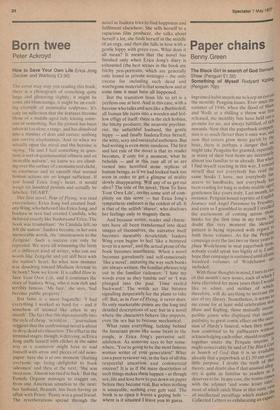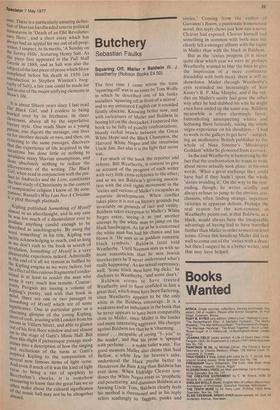Paper chains
Benny. Green
The Black Girl in search of God Bernard Shaw (Penguin £1.50) Something of Myself Rudyard KiPling (Penguin 70p)
Ingrained habit impels me to keep an eye on the monthly Penguin issues. Ever since the summer of 1946. when the flood of Shaw and Wells at a shilling a throw was fiat released, the monthly lists have held out 3 promise for me, not always fulfilled, of rich rewards. Now that the paperback conaPcti: tion is so much fiercer than it once was, alto now that covers grow more garish by the hour, there is perhaps a danger that we might take Penguins for granted, especiallY as many of their best items are necessarilY almost too familiar to us already. But whenA I find myself reacting in this way, I renlifi" myself that not everybody has read the same books I have, not everybody ha5 access to hardbacks, not everybody hal been reading for long as sedate middlerage" gentlemen like yours truly. Last month, for instance, Penguin issued reprints of Engliw Journey and Angel Pavement by PriestleY] and even as I grumbled to myself recalleu the excitement of coming across those books for the first time in my teens. N9 doubt this very moment the identical pattern is. being repeated with regard t° both those volumes. As for the Penguin campaign over the last two or three years to place Wodehouse in neat paperback fora nobody could speak too highly of it, I oillY hope that campaign is sustained until alio° hundred volumes of Wodehouse are included. With these thoughts in mind, I turn to two,‘ of this month's new issues, each of which have cherished for more years than I .woulin like to admit, and neither of whir therefore, will do anything to increase the size of my library. Nonetheless, it seems rc me cause for at least mild celebration that Shaw and Kipling, those mutually incb.rtr patible giants who displayed that inorilpatibility to great comic effect on the occasion of Hardy's funeral, when they s0111; how contrived to be pallbearers witnr acknowledging each other, should reaPPe together under the Penguin imprint. might conceivably be said of The Black Glier in Search of God that it is so available already that a paperback at £1.50 can se,rv t little purpose. I doubt the truth of taa theory, and doubt also if that unusual al.; ory is quite as familiar to readers as deserves to be. In any case, the bonus cotae,' with the adjunct `and some lesser tan; most of which catch Shaw in that same vebe of intellectual persiflage which makes Collected Letters so exhilarating an exPe' eke. There is a particularly amusing definition of Shavian hardheaded coterie political Manoeuvre in 'Death of an Old Revolutionary Hero', and a short essay which has always had an appeal for me out of all proportion, I suspect, to its merits, 'A Sunday on the Surrey Hills', featuring Henry Salt. As this piece first appeared in the Pall Mall Gazette in 1888, and as Salt was also the subject of the last piece of prose,which Shaw coMpleted before his death in 1950 (an introduction to Stephen Winsten's biography of Salt), a fair case could be made for Salt as one of the major unifying elements in Shaw's life.
It is about fifteen years since I last read ,The Black Girl, and I confess to being bowled over by its freshness, its sheer Cleverness, above all by the superlative literary style. One reads Shaw as a young Person, one digests the message, one lives cm for another decade or two, and then, on returning to the same passages, discovers that the experience of life acquired in the cantime has done little or nothing to .trivalidate many Shavian assumptions, and done absolutely nothing to reduce the egtfervescence of the writing. The Black ',Id, when read in conjunction with the prelace to A ndrocles and the Lion, constitutes the best study of Christianity in the context Of comparative religion I know of. By comparison, Russell's Why Jam Not A Christian is a plod through platitude, Kipling published Something of Myself almost as an afterthought, and in any case he was too much of a dissimulator ever to Produce anything candid enough to be described as autobiography. By using the word 'something' in his title, Kipling was tacitly acknowledging as much, and so long as We don't rush to the book in search of revelation, Something of Myself is a very Pleasurable experience indeed. Admittedly at the end of it all we remain'as baffled by the Kipling enigma as we were before, but _"‘le effect of this curious fragmented confessional is at least to render the man who Wrote it very much less remote. Concurrently Penguin are issuing a volume of '3Pling's poetry, and with that book in ind, there are one or two passages in ‘.0tnething of Myself which are of some significance. One in particular gives us a char ;
aLog glimpse of the young Kipling,
short of cash, jousting with London from his rooms in Villiers Street, and able to glance out of his first-floor window and see almost 211 to the stage of Gatti's Music Hall. But then this slight if picturesque passage modulates into a description of how the singing 111:1 recitations of the turns at Gatti's inspired Kipling to the composition of Several now famous items of light verse. ..`"Incl even if much of it was the kind of light verse to bring a tint of apoplexy to Beerbohm's cheeks, it is somehow reassuring to know that the great fuss we so c'ften make about the cultural significance of the music hall may not be be altogether absurd.







































 Previous page
Previous page